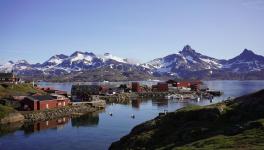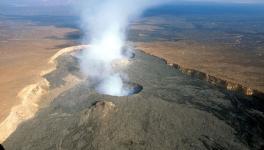New Study Says Half the World’s People Live Amid High Air Pollution
With air pollution becoming an increasing menace, a recent study study says that over half the world’s population is living amid a high level of pollution in the air around them.
Vehicular emissions and industry borne pollutants are the major contributors to the degrading air quality across the world. At the same time, unabated deforestation and extraction of natural resources have added to worries. Pollution in the air is not restricted to specific regions or countries anymore; it has become a global problem.
The study, conducted by the McGill University in Canada and published in the World Health Organisation’s (WHO) Bulletin, has brought out some worrisome findings.
The research focuses on the pollutant called PM 2.5 (particulate Matter 2.5). PM 2.5 are particles whose size is 2.5 micrometers in diameter or smaller. These tiny particles floating in the air pass through our respiratory tract and are the cause of diseases in our lungs. According to estimates PM 2.5 causes 4.2 million premature deaths worldwide every year.
The researchers found that even in places where protection measures are in place the standards are much worse in comparison to what WHO guidelines say. Many regions, for example the Middle East, don’t even measure PM 2.5 while assessing air quality.
The study also found that even the weakest standards of air quality maintenance are largely violated in countries like China and India with the likes of Canada and Australia maintaining the strictest standards.
Even developed countries are not spared from deaths caused by the PM 2.5 pollutant. It causes over 2,00,000 yearly deaths in Europe and takes the lives of over 50,000 people annually in the US. More worryingly, China loses over a million people to it each year while India suffers around half a million deaths per year.
Premature deaths caused by PM 2.5 are under-reported and the world is yet to respond adequately to mitigating its dangers. The deaths are in even larger numbers than deaths due to COVID-19. Professor Parisa Ariya, a co-author of the study and a professor in chemistry at McGill, reportedly said: “In Canada, about 5,900 people die every year from air pollution, according to estimates from Health Canada. Air pollution kills almost as many Canadians every three years as COVID-19 killed to date.”
The tiny particles areresponsible for most of the deaths caused by air pollution on a global scale. It kills more people than other air pollutants. Yevgen Nazarenko, the lead author of the study and a research associate at McGill was quoted saying that while countries “adopted unprecedented measures to protect people from COVID-19, yet we don't do enough to avoid the millions of preventable deaths caused by air pollution every year.”
There are also some interesting findings in the study. It was found that high population density does not seem to be a barrier in fighting air pollution. The study found that there several places with high population density where strict standards were maintained successfully. A few examples were Japan, Taiwan, Singapore, El Salvador and Trinidad and Tobago.
“Our findings show that more than half of the world urgently needs protection in the form of adequate PM2.5 ambient air quality standards. Putting these standards in place everywhere will save countless lives. And where standards are already in place, they should be harmonized globally,” Nazarenko said.
Get the latest reports & analysis with people's perspective on Protests, movements & deep analytical videos, discussions of the current affairs in your Telegram app. Subscribe to NewsClick's Telegram channel & get Real-Time updates on stories, as they get published on our website.
























